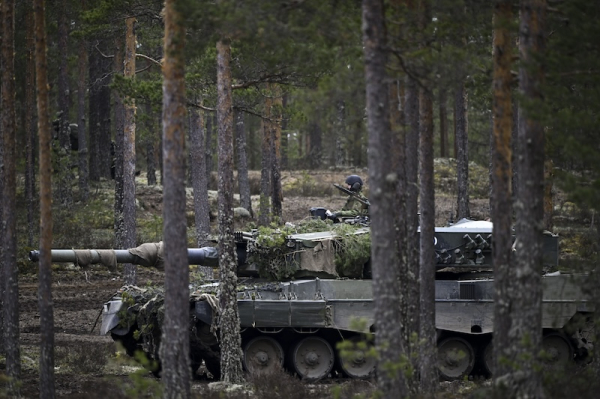
Army’s Armoured Brigade-led mechanised exercise Arrow 24 at the Niinisalo garrison in Kankaanpää. LEHTIKUVA
- Next Article Equality in Finnish music industry slowly improving but discrimination persists
Finnish volunteer soldiers serving in Ukraine say Finland is not ready to face a potential Russian military threat, citing outdated training and a lack of preparation for modern drone warfare.
Speaking from military positions and memorial sites in Ukraine, the volunteers criticised the current state of Finland’s defence readiness. They also questioned the country’s policy on fundraising for military assistance, saying Finnish law prevents public support for Ukrainians and foreign volunteers fighting on their behalf.
Finn, a Finnish national who has spent the last three years fighting in Ukraine, said much of what he learned during his Finnish Defence Forces (FDF) training no longer applies.
“Warfare has changed entirely,” he told Yle, describing drone use as a dominant feature of today’s battlefield. “If Russia attacked Finland right now, the initial losses would be catastrophic. Infantry have no way to protect themselves from drones.”
Finn, who previously worked as a welder, said his decision to fight in Ukraine followed reports of Russian atrocities in Bucha and Mariupol. He has taken part in several high-profile operations, including the 2023 Ukrainian counter-offensive. Four of his unit members have died, and he himself was injured in the Battle of Bakhmut.
“I think it would be wrong to pack up and say, ‘That’s it,’” he said.
Mikko, another Finnish soldier fighting in Ukraine, echoed similar concerns. “Finland does not understand the scale to which drones are used on the battlefield,” he said.
He described modern electronic warfare as a standard feature of the front line. Vehicles and even individual soldiers in Ukraine are routinely equipped with jamming systems. “The Russians have so many drones they are free to choose who they kill,” he said.
Both Mikko and Finn said they see their presence in Ukraine as defending Finland and Europe. Neither believes the war will end soon.
The Finnish Defence Forces responded to the claims by stating they monitor the war in Ukraine closely and are continually updating their capabilities.
“The Defence Forces are constantly developing their own performance and expertise to meet the requirements of the threat environment,” the military told Yle.
But according to the volunteers, that is not enough. “Nobody seems to understand the huge number of drones here,” Finn said.
A Finnish flag now stands in Maidan Square in Kyiv in memory of one of their fallen compatriots. Mikko placed it there alongside a diary excerpt from the deceased soldier. “It is now the duty of peaceful nations to stand up,” it read.
Funding restrictions draw criticism
While the soldiers are employed and paid by the Ukrainian army, they receive no support or formal status from Finland. Volunteer group Your Finnish Friends has supplied equipment and gear, which Mikko said often exceeded what was issued by Ukrainian forces.
“It’s a lifeline for us,” he said.
Mikko criticised Finland’s laws on fundraising for military aid, which prohibit raising money for combat-related equipment or soldier support.
“How is it that fighting here for the interests of Finland and Europe is not an activity of public benefit?” he asked.
The current restrictions have triggered political debate in Finland. The Parliamentary Friendship Group for Ukraine has proposed changes to the law. According to Turun Sanomat, more than 100 MPs have expressed support across party lines.
In addition to drones, Mikko and Finn highlighted electronic warfare and combat experience as areas where Ukrainian training far surpasses Finnish standards. They said such skills would be essential if Finland faced military aggression from Russia.
According to the Ministry for Foreign Affairs and the Finnish Security and Intelligence Service (Supo), around 100 Finnish nationals have volunteered to fight in Ukraine since the war began in 2022.
After returning from his first tour, Mikko said he struggled with reintegration.
“I couldn’t sleep at night. I was angry all the time,” he said.
Finn, reflecting on his own experience, said the war had changed him permanently. “I don’t know if I’ve become a bit numb. When someone dies, I just say ‘one 200’ on the radio,” he said, using the Ukrainian army code for a fallen soldier.
HT
- Next Article Equality in Finnish music industry slowly improving but discrimination persists
Source: www.helsinkitimes.fi
